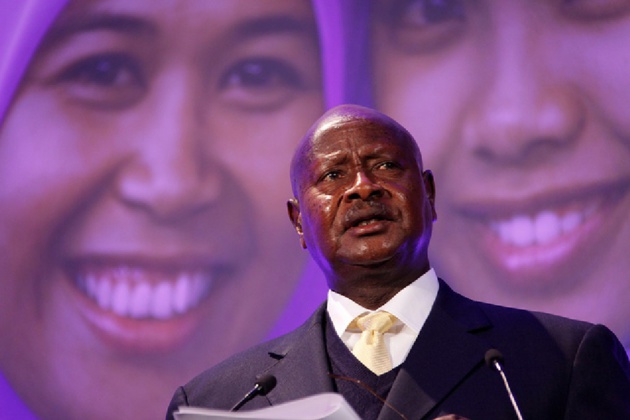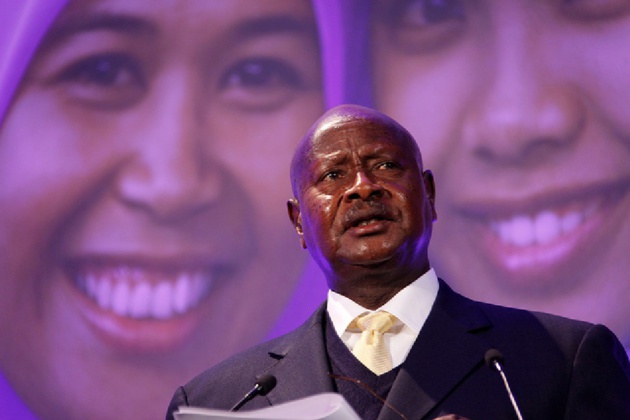
Credits: Flicker / cc DFID - UK Department for International Development
After two decades of a deadly war against Joseph Kony’s Lord’s Resistance Army (LRA), in the northern part of the country, Uganda has been free of conflicts for only a few years. Various conflicts in the eastern part of the Democratic Republic of the Congo allowed Yoweri Museveni to play an important role and act as kingmaker when the time came to replace Marshal Mobutu with Laurent Désiré Kabila in 1997, while numerous border conflicts have maintained tension between the two countries.
Due to the Kivu’s unstable situation, several rebel groups have formed and have threatened Uganda over the last 20 years. The Islamists of the Allied Democratic Forces (ADF), who are now hunted down and almost silenced, were for a long time threatening to attack Western Uganda and Kampala, the capital.
Even though the country is free of conflicts, Museveni’s foreign policy is largely an interventionist one, turning his country into a major regional power. The Ugandan army is everywhere: the troops are taking part in the civil war in South Sudan, in the African Union Mission in Somalia (AMISOM) to maintain peace, in tracking down the few LRA members left in Central Africa and the ADF members who are left in the Democratic Republic of the Congo.
However, the consequence of being so powerful is not, as it turns out, perfect serenity. The Ugandan intervention in the fight against Somalia’s Shebab insurgents has prompted the latter to increase the number of their attacks. This is what happened in the capital, on the night of 11th July 2010, when three bombs exploded in bars, which were crowded due to the final of the Football World Cup. Those attacks traumatised the whole country and killed 74 people, paving the way for the very strict rules that are now implemented in the capital.
The economy has finally recovered
Uganda’s economy is undoubtedly doing better. The outlook is encouraging: almost 6% growth, numerous investors, plenty of soon-to-be-exploited oil in the northeast… While the poverty rate fell below 20% in 2013, there remains a significant number of inequalities, and 80% of the population still earns its livelihood from farming. Uganda’s economy is poorly diversified, stalling, and sells its unprocessed resources to investors. However, the recovery has been spectacular, after the difficult years that followed the structural adjustments of the 1980s and the 1990s.
The incumbent President’s main satisfaction is in having reached all of the Millennium Development Goals. While it could be argued that he played with threshold effects and favoured those figures over more qualitative, global results, health indicators, such as the literacy rate, have improved significantly over the last decade. Considered as one of the countries most affected by AIDS in the 1990s, Uganda has become a model in the fight against HIV, which fell from a rate of prevalence of 18% in 1992 to 7.4% in 2015.
Growth has also had negative consequences on the environment. While a large part of the Mabira Forest, east of the capital, was destroyed to make room for tourism, global warming is threatening the otherwise productive coffee sector and melting the ices on the Rwenzori Mountains, near the border with the Congo.
A regional power
Apart from insurrections and conflicts, Yoweri Museveni’s foreign policy record makes him the major East African politician. He acted as mediator during the crises in Congo and Burundi, and is one of the pillars of the East African Community (EAC), composed of Uganda, Kenya, Tanzania, Rwanda and Burundi. Still in its fledgling stages after going through several reincarnations, the regional organisation has been developing for a few years under the impetus of its longest‑serving leader, Yoweri Museveni. A railway is being built between Uganda, Kenya and Tanzania, and single currency projects are being examined.
Uganda’s allies have been diverse over the last three decades - one could even say, contradictory. Muammar Gaddafi, who was already a close ally of Idi Amin Dada, got closer to Kampala until he was ousted from Libya. Yoweri Museveni then offered him diplomatic asylum. Still, Western countries are not rejected, unless they criticise certain national laws, while China, India and other emerging economies from Asia or the Gulf region invest more and more often.
A fierce detractor of the International Criminal Court, Uganda’s president did not seem to have much remorse when he allowed the ICC to judge the leaders of the Lord’s Resistance Army’s former rebellion. This stand against the West, just for show, is the spitting image of the strategies of his neighbour and best ally, Rwanda’s Paul Kagamé.
A return to moral order
While the country is opening itself up to free trade, its society is becoming more conservative, encouraged by the radical and influential speeches of Evangelist preachers. While Uganda’s anti-gay law hit the international headlines in 2009, the majority are defending other controversial texts.
The much publicised and widely discussed "anti-pornography law ", also called the “miniskirt ban”, aims to prevent people from dressing inappropriately in public spaces. While its implementation remains limited, it has led to women being harassed on the streets and forcefully undressed by strangers. A controversial law on HIV also sanctioned more strongly “the voluntary transmission of the HIV virus”, while NGOs now have to abide by a new law which strengthens the state’s control over them.
These laws are often criticised by human rights defence organisations. They believe that the Evangelists, whose influence is made even stronger by First Lady Janet Museveni, are growing closer to state power. Funded mostly by neoconservative North Americans, those churches are among the country’s richest and gain more ground every day.
It is difficult, then, to have a global perspective on those thirty years in office, that were marked by war as much as by peace, by prosperity as much as by the economic crisis. While the last few years have been an improvement, it would be premature to attribute them to the governance of such an influential and controversial man, who has the West – and maybe even the Ugandans themselves – puzzled.
Le Journal International’s Live tweet of the first round .




























